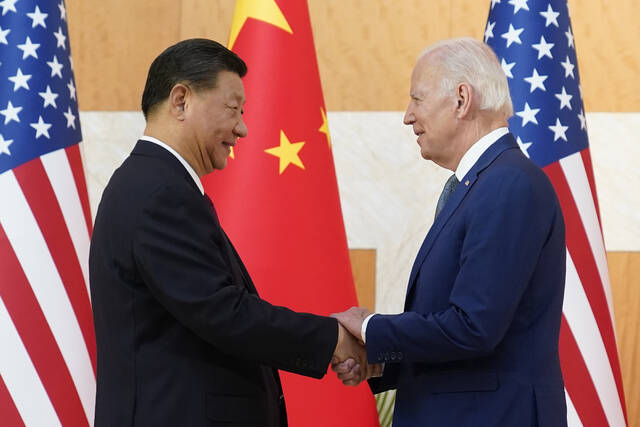https://naviga.triblive.com/opinion/peter-morici-biden-administration-needs-to-negotiate-a-cease-fire-to-the-u-s-china-cold-war/
Peter Morici: Biden administration needs to negotiate a cease-fire to the U.S.-China cold war

America and China have slid into a cold war, and we should be thankful if tensions don’t spill into a full-blown conflict.
China boasts the largest navy in the world and hypersonic and carrier-killing missiles that could quickly disable U.S. military assets in the South China Sea and Pacific. Those capabilities make precarious the U.S. defense of Taiwan and could force the U.S. to accept Chinese dominance through critical lanes of commerce in the South China Sea.
All this would compromise the sovereignty of nations from the Philippines to Malaysia, Vietnam, Australia and New Zealand, along with U.S. commercial interests in the region.
Like a leader preparing for war, China’s President Xi Jinping has consolidated his power within the Chinese Communist Party and streamlined government agencies to assert greater control over public and private enterprises.
The CCP is placing representatives on corporate boards and in key management positions at Chinese companies. Beijing has taken “Golden Shares” in private businesses to better guide business strategy. Xi also is prioritizing China’s self- reliance in critical technologies, including semiconductors and agricultural commodities.
Much of this movement is a logical response to geography and to U.S. policy. Even if China were content to compete peacefully with the West in economic spheres and for global influence, it would naturally feel threatened by continued U.S. naval dominance of the South China Sea and western Pacific. The South China Sea alone carries about one-third of global sea-borne trade and provides passage for 80% for China’s oil imports and 65% of its total trade.
Taiwan’s democracy and economic success offers a discomforting contrast for the CCP’s implicit bargain with the Chinese people — authoritarian rule in exchange for rising prosperity. Except China’s market-socialist economy and methods have proven incompatible with Western market-capitalism.
The WTO has been inadequate for settling trade and business disputes. President Joe Biden’s industrial policies for semiconductors, EVs and batteries and green energy pose a direct challenge to China, as do extensive U.S. trade and foreign investment sanctions.
Despite having accomplished leadership or at least parity in manufacturing process technologies, supercomputers, artificial intelligence, solar panels, EVs and batteries, China maintains an aggressive program of industrial espionage and is weaponizing its patent courts to directly appropriate the technology of Western firms.
The U.S. — together with the Netherlands and Japan — is severely curtailing exports to China of machinery used to make leading-edge semiconductors, and the U.S. is seeking to further orchestrate limits on exports and investment in China.
China and the United States are withdrawing into two separate R&D and production systems in varying measure for computer hardware, components and software, artificial intelligence, green industries and essential raw materials. Those will find a place in both China’s and the U.S.’s weapons development and deployment.
The U.S. is handicapped in several dimensions. By the middle of the next decade, China will have a larger economy as measured by GDP and is capable of increasing its military spending 7% each year against much lower domestic inflation. Meanwhile, the U.S. military budget is not keeping pace with inflation.
U.S. military planners also are proving inept, with slow and failed weapons development projects, while the Chinese military-industrial complex is terribly efficient. The U.S. overshadows China on miltary expenditures by a wide margin, but the Chinese military is acquiring new weapons five or six times faster than the Pentagon.
Taiwan must be defended owing to its strategic value in the production of semiconductors and their geostrategic importance to Japan and the Philippines, but China could stumble the world into war elsewhere.
China’s military has been harassing Philippine naval vessels and challenging U.S. aircraft in the South China Sea. One of those incidents could easily escalate into China attempting to regulate commercial passage and face the U.S. Navy. Then the dominos would fall.
Biden and future U.S. presidents face the complex challenge of boosting U.S. presence in Asia. This requires reforming the Pentagon — specifically, the efficiency of weapons development, manufacturing and deployment — to match its Chinese counterpart.
It’s imperative to negotiate a detente that permits China a sense of greater security about its vital interests and gives the U.S. the capacity to support the sovereignty of its allies and commerce in Asia.
Peter Morici is an economist and emeritus business professor at the University of Maryland.
Copyright ©2026— Trib Total Media, LLC (TribLIVE.com)
